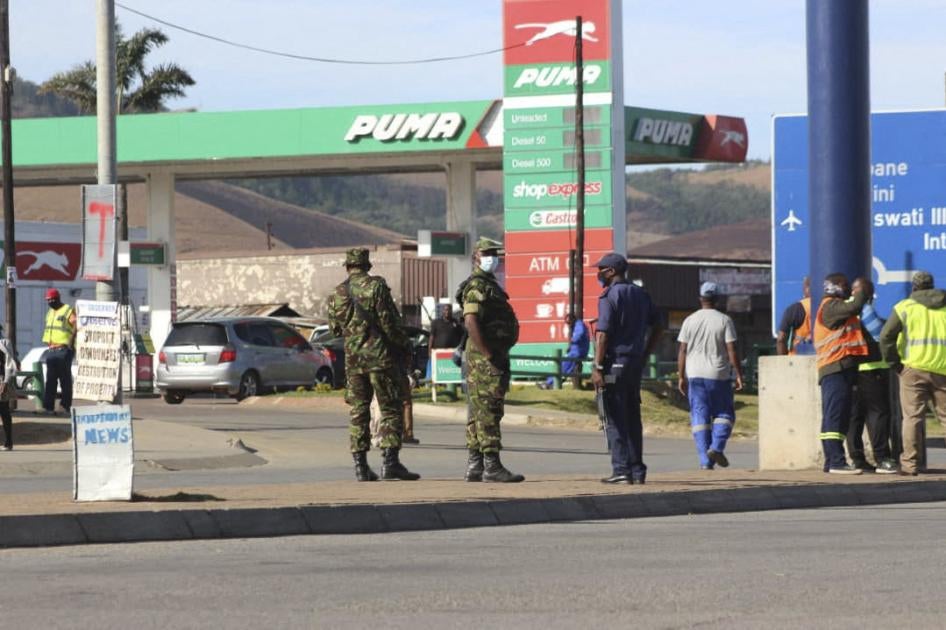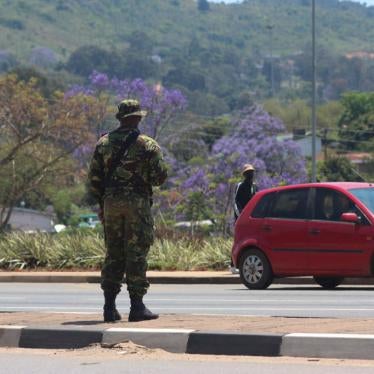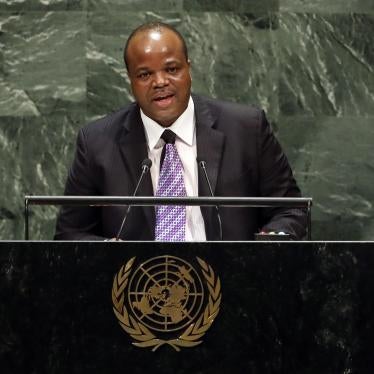(Johannesburg) – Eswatini authorities should ensure accountability for their security forces’ crackdown on protesters in June 2021, Human Rights Watch said today. Despite concerns, including by the United Nations Office of the High Commissioner for Human Rights, that Eswatini security forces used live ammunition and engaged in “disproportionate and unnecessary use of force,” as far as Human Rights Watch has been able to determine, no member of the security forces has been held accountable.
A report published on October 29 by the Eswatini Commission on Human Rights and Public Administration says that at least 46 people died during the June protests; 245 people had gunshot injuries; 22 people multiple gunshot injuries; and 118 people had unspecified injuries. Victims told the commission that they were shot by members of the Eswatini armed forces. While the report covers protests in June, the protests have continued, together with reports of excessive use of force by Eswatini security forces, Human Rights Watch found.
“The Eswatini government should urgently agree to an independent, international investigation into all of the killings and any other human rights violations resulting from excessive use of force,” said Dewa Mavhinga, Southern Africa director at Human Rights Watch. “The Human Rights Commission said it faced constraints and was unable to cover all the alleged human rights violations during the June protests.”
Human Rights Watch found that on October 20, Eswatini police fired live ammunition and teargas into a bus full of people traveling to the capital, Mbabane, to protest the incarceration of two pro-democracy members of parliament. According to witnesses, some of the bus passengers were injured and had to be hospitalized, the rest were turned back and prevented from going into the city center.
A public transport driver told Human Rights Watch that on the same day, he was shot in the legs by a uniformed member of the police at point blank range in Mbabane. The driver was not involved in the protests. Human Rights Watch spoke to a 17-year-old student who said the police shot him in October causing severe injuries that left him paralyzed. No arrests have been made in relation to these shootings.
The commission recommended that the Eswatini government should “initiate an independent, thorough, credible, transparent and impartial investigation by experts with relevant skills and knowledge into allegations of human rights violations and abuses and to bring those responsible to justice.”
The commission also called on the government to “ensure the full exercise of the right to peaceful assembly and protest, in accordance with the Eswatini’s Constitution and international obligations; and use all appropriate means to ensure that these rights can be exercised freely and securely, including by making sure that the safety of demonstrators is guaranteed.”
International human rights law, including as set out in the African Charter on Human and Peoples’ Rights, guarantees the rights to freedom of expression and assembly, and prohibits excessive use of force by state officials. As spelled out by the United Nations Basic Principles on the Use of Force and Firearms, security forces may use force only in proportion to the seriousness of the offense, and the intentional use of lethal force is permitted only when strictly unavoidable to protect life.
The Eswatini Minister of Information, Communication, and Technology (ICT) and the eldest daughter of King Mswati III, Princess Sikhanyiso, denied that the Eswatini security forces used excessive force and alleged that unknown mercenaries invaded the country in uniform masquerading as the country’s soldiers and police to kill the people. However, the Eswatini Commission on Human Rights found no evidence to substantiate Princess Sikhanyiso’s claims and there are no recorded arrests of any mercenaries in Eswatini.
The Southern African Development Community (SADC), which deployed special envoys to Eswatini in October, said on October 23 that King Mswati, Africa’s last absolute monarch had agreed to national dialogue following the protests. Justice and accountability for security forces violations should be central to any dialogue process, Human Rights Watch said.
Several activists told Human Rights Watch in telephone interviews in October that they were disappointed with SADC efforts in Eswatini. They said that the United Nations High Commissioner for Human Rights should press for access to Eswatini for independent international observers to assess the human rights situation. Some local activists said that neighboring countries should exert targeted pressure on the king and other Eswatini authorities to allow a full investigation and accountability for the attacks on protesters or face regional isolation or other sanctions.
“Neighbors and the international community should not ignore the festering Eswatini crisis,” Mavhinga said. “Targeted and effective regional pressure is needed to press Eswatini to address justice, accountability, and respect for the human rights of all Eswatini people.”
|
News Release
Eswatini: No Justice for June Protester Killings
New Reports of Attacks by Security Forces
Your tax deductible gift can help stop human rights violations and save lives around the world.
Region / Country
Topic
Most Viewed
-
November 25, 2019
A Dirty Investment

-
May 12, 2025
The Gig Trap

-
February 4, 2026
Iran: Human Rights Situation Spirals Deeper into Crisis

-
September 30, 2024
“They Destroyed What Was Inside Us”

-
January 23, 2018
Hidden Chains




